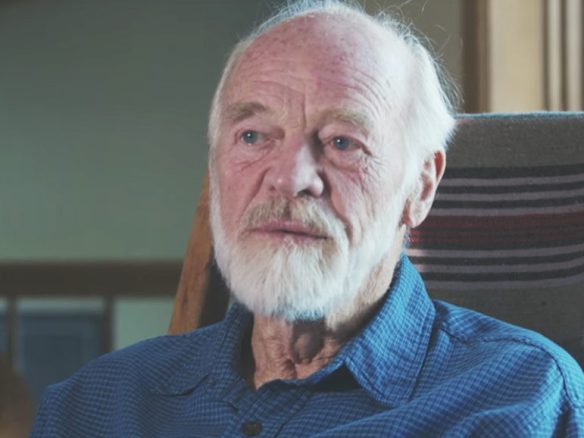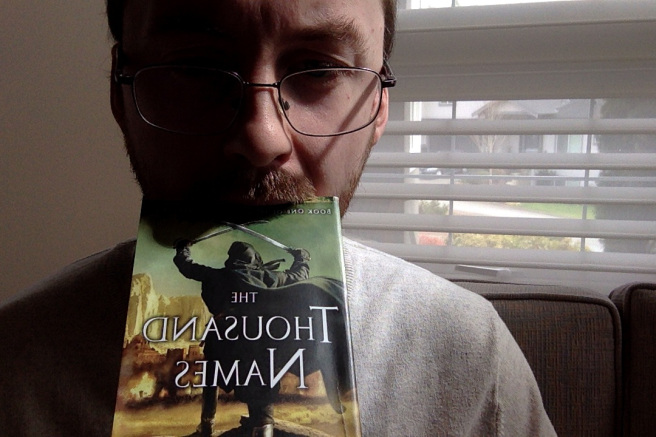
Eugene Peterson, perhaps wistfully wishing he’d never granted that recent interview.
At least, I suspect it must have, because I find myself in the extremely rare position of agreeing with Albert Mohler.
Well, kind of.
Mohler is the current president of the Southern Baptist Theological Seminary here in Louisville, and a high-powered bullhorn for conservative Evangelical Christian theology. Without giving a list of particulars – it would be long – let’s just say that it would be hard to find someone whose understanding of Christianity differs more from my own.
Still, I will give Mohler credit for at least one statement that he made that I think is absolutely spot-on, even while I disagree strongly with his ultimate conclusion.
In recent days, the best-selling Evangelical author/retired pastor Eugene Peterson created a stir in religious and some broader social circles when he gave an interview to Jonathan Merritt of Religion News Service. Peterson has recently announced that he’s leaving the lecture circuit, slowing down, and taking life easy from this point on. And at 84 years old, why not? The man has clearly earned it.
Given that, and his long string of best-selling books, this interview should have been a fluff ball – a victory lap of sorts for Peterson; a nice, feel-good piece that offered no big news or controversy. What actually transpired, though, was something else entirely.
Merritt asked Peterson about his views on homosexuality in general, and same-sex marriage in particular from the context of the Christian faith, and whether his views on these issues had changed at all over time. Even though Peterson’s popularity has largely been within conservative Evangelical circles, he was actually a long-time pastor and is a member of the Presbyterian Church (USA), one of the most progressive of mainline denominations and one that, thanks be to God, has affirmed LGBTQ individuals’ place in the full life of the church – including ordained positions, and the appropriateness of church-blessed same-sex marriages.
Merritt’s question arose out of comments that Peterson had made in recent years that he’d changed his mind and had become affirming of LGBTQ people – including in this appearance at Western Seminary in 2014.
To be honest, I thought Peterson’s answers to Merrit’s questions in the interview were a bit lukewarm in their support. His comments were couched in phrases like “I didn’t have much experience with that,” or referring to a lesbian couple in his congregation that “didn’t make a big deal out if it,” and so on. I could almost imagine him saying that he could accept LGBTQ parishioners as long as they “didn’t shove it down my throat;” that great cliche that seems to mean “It’s OK if you’re gay; just don’t do anything that might publicly show that you are. Don’t say or do anything, either as an individual or as a couple, that straight people do with regard to their lives and relationships without any problem. Don’t talk about your significant other, don’t hold their hand, and certainly don’t kiss them where anyone else could see you.” That was the sort of tepid support I heard in most of Peterson’s answers. Still, they were several steps ahead of the typical conservative Evangelical party line. And he did, simply but clearly, say that he’d officiate a same-sex wedding if asked.
Of course, to have someone as influential as Peterson come out (sorry) and say these things was big news for conservative and progressive Christians alike, for obvious and opposing reasons.
Within 24 hours, though, Peterson felt forced to release a clarification and retraction of what he’d said in the interview. People across the full spectrum of American Christianity were confused by this bizarre flip-flop, what had led to it, and whether it was a good or bad development. Had an 84-year old man simply gotten confused in the moment and said some things that he didn’t really believe? Had conservative backlash – he was blowtorched by conservative Evangelical mouthpieces within hours – and threats to book sales (LifeWay, the largest U.S. retailer of Christian publications, and an affiliate of the Southern Baptist Convention, threatened to stop sales of all of Peterson’s books) led to his overnight reversal?
In the wake of this bit of theological whiplash, many people have offered their thoughts about the issue. And here’s where Albert Mohler enters the picture.
As would be expected, Mohler firmly occupies the conservative, traditional, exclusivist, non-LGBTQ-affirming understanding of the Christian faith. Mohler himself would define his views as the “biblical” position. I refuse to grant him that semantic bit of theological high ground, since it incorrectly assumes that the Bible “quite clearly” calls for anti-LGBTQ theology; and that those who have reached LGBTQ-affirming understandings of the faith have done so without, or in spite of, the scriptures, a position that is categorically false.
But I digress.
In an article he wrote about the Peterson kerfuffle, Mohler criticizes Peterson for what he sees as indecisiveness – not offering clear-cut, definitive, conservative Evangelical answers to LGBTQ questions, and sticking to them. Perhaps Mohler sees Peterson’s initial answers as having been an attempt to curry public favor by adopting more socially acceptable positions; a situation of society inappropriately influencing one’s understanding of the faith. Maybe he sees it as a legitimate theological struggle within Peterson’s heart and mind. Or maybe he sees it as something else. Whatever the explanation, Mohler says that indecision is a problem, and not only for Peterson. He writes:
“First, there is nowhere to hide. Every pastor, every Christian leader, every author — even every believer — will have to answer the question. The question cannot simply be about same-sex marriage,” he says; at its core, the real issue is having a decisive understanding of what one believes to be the will and purpose of God with regard to human sexuality and gender, based on sound scriptural interpretation.
“Second, you had better have your answer ready. Evasive, wandering, and inconclusive answers will be seen for what they are. Those who have fled for security to the house of evasion must know that the structure has crumbled. It always does.”
And on this score, he’s absolutely right.
Mohler and I would clearly disagree on what “sound scriptural interpretation” would be. In fact, I couldn’t even agree with some of his wording in the quote above; hence my partial paraphrasing. But we both agree that we need to have studied and prayed about the question of LGBTQ individuals in the life of the church, and we need to reach a solid, scripturally consistent answer to the question, and then be willing to stick with it. Of course, Mohler and I diverge radically from that point on, but on this, we agree.
This isn’t a question about which a person can be ambivalent, ambiguous, both/and. You can’t be a little bit pregnant, and you can’t be a little bit affirming (or non-affirming). Affirming theology hinges on a person’s core beliefs about God, creation, human anthropology, and the nature of the divine-human relationship. In order to work out where you are regarding LGBTQ people, you need to have first determined in your heart and mind whether homosexuality is a sin. If it is sin, is it a sin of choice, or a part of so-called “original sin” and therefore, impossible to eliminate from human existence? If it is a type of unavoidable “original sin” as a result of “the fall,” what is the proper response of God and humanity to that? Or, is homosexuality merely a normal variation within the full spectrum of what it means to be human, and therefore of having been created in God’s image? And if this is the case, is refusing to be accepting and affirming toward LGBTQ people refusing to accept and affirm the One in whose image they were created? If you believe that homosexuality is a sinful choice, is it possible to affirm same-sex marriage? How about if it is part of “original sin;” can same-sex marriage be accepted and affirmed as the best possible “option B” for people who don’t have opposite-sex marriage as an option to still have loving, committed, sacrificial unions that are blessed by God? And if you believe that homosexuality is just another variation in human creation, can you somehow not accept and affirm same-sex marriage?
There is no meaningful way that individuals or faith communities can accept these divergent theologies as equally valid options for believers. Each one inherently negates the possible validity of the others. Just as it is impossible for a person, or a faith community, to claim that it’s equally valid and acceptable to both accept and reject slavery, or segregation, or the subjugation of women, so it is also with this issue. It goes to the fundamental way that we understand God and human creation, and whichever way you believe, logically, it’s a package deal – you’re either all in, across the board, or you aren’t in at all.
There really is no middle ground with regard to affirming LGBTQ people, except as a transitional place while moving to a final position. For virtually everyone who has adopted affirming theology, myself included, the process has been a journey with several interim stages. That’s understandable. But to be partly affirming of LGBTQ people, accepting this part of them – whether in the life of the church or society in general – but not some other part, just isn’t viable long-term theology. On this score, Mohler is absolutely correct.
He’s also correct in saying that a person needs to be ready, when asked, to give a decisive, consistent , cohesive explanation of what they believe about LGBTQ people – because if you try to voice some waffling middle-of-the-road theological stance in order to try to please everyone, it will be immediately obvious to everyone, and you will end up being rejected by those on both sides of the issue.
The price that Eugene Peterson has paid in the last week shows how fraught with risk the transitional, middle places of such a journey toward LGBTQ affirmation can be, and how important it is to move toward the final destination as quickly as possible. Ironically, I don’t think Peterson himself is still in the process of making that journey at all – I think that in his own way, he’s already completed the journey to full affirmation, despite his written retraction. If Eugene Peterson has indeed retired from the public eye, and if this was his last interview, the final lesson he seems to have inadvertently offered the faithful is just how important it is to have the courage of one’s convictions, and of standing up and voicing them clearly, boldly, and publicly even in the face of opposition. It’s an important lesson for all of us. I hope we don’t have to wait for hell to freeze over again before Peterson learns it for himself.
Advertisements Share this:

![The Ringmaster's Wife by [Cambron, Kristy]](/ai/043/132/43132.jpg)


